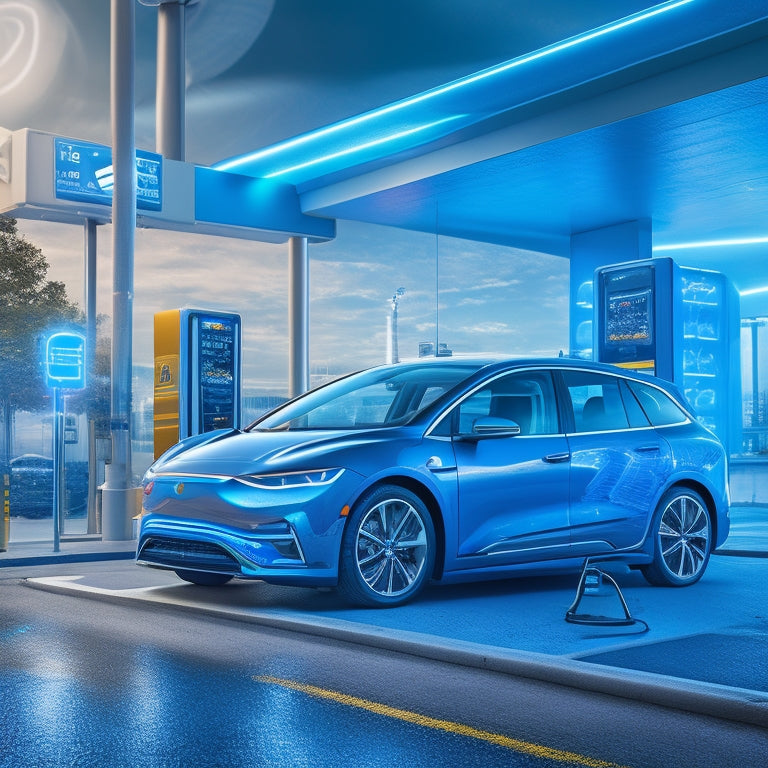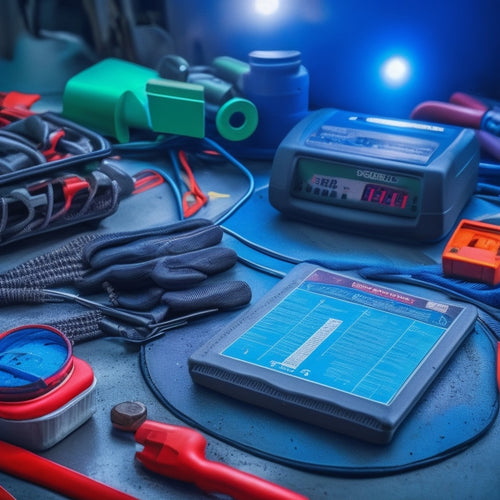
Rapid Power for Personal EVs: Battery Solutions
Share
As you seek rapid power for your personal EV, you'll want to explore advanced battery management systems that regulate crucial parameters, ensuring your battery operates within a safe zone for peak performance. High-power charging systems with efficient thermal management can reduce range anxiety. Meanwhile, innovations in lithium-ion batteries, ultra-fast charging technologies, and next-gen energy storage solutions promise faster acceleration, longer driving ranges, and reduced charging times. From solid-state architectures to graphene enhancements, the future of EV energy storage is poised to revolutionize the industry - and discovering these secrets could be the key to effortless EV ownership.
Key Takeaways
• High-power charging systems with advanced cooling enable rapid replenishment of EV batteries, reducing range anxiety.
• Advanced battery management systems regulate critical parameters to ensure safe and optimal battery performance.
• Lithium-ion battery innovations, such as solid-state architectures, increase energy density and power density for faster acceleration and longer driving ranges.
• Ultra-fast charging technologies can charge EVs to 80% in under 15 minutes, providing convenient and rapid refueling options.
• Next-gen energy storage solutions, including graphene enhancements, promise longer drives between charges and reduced charging times.
High-Power Charging Systems
Your electric vehicle's high-power charging system is essential for rapid replenishment of its battery, allowing you to regain hundreds of miles of range in under 30 minutes. This is made possible by the system's high power density, which enables the efficient transfer of energy to the battery.
To achieve this, the system must be designed with thermal management in mind, as high-power charging generates significant heat. Effective thermal management guarantees that the system operates within a safe temperature range, preventing overheating and reducing the risk of damage to the battery or charging components.
A well-designed high-power charging system will also incorporate advanced cooling systems, such as liquid-cooled charging cables, to maintain ideal operating temperatures. By combining high power density with efficient thermal management, your electric vehicle can charge rapidly and safely, giving you the freedom to drive without range anxiety.
Advanced Battery Management Systems
As you depend on your electric vehicle to take you farther, advanced battery management systems step in to guarantee the longevity and performance of your battery, regulating critical parameters like state of charge, voltage, and temperature to prevent premature degradation. These systems ensure your battery operates within a safe zone, maximizing its lifespan and overall performance.
Advanced battery management systems employ various techniques to maintain excellent battery health. One essential aspect is Cell Balancing, which involves monitoring and adjusting individual cell voltages to prevent overcharging or undercharging. This ensures that all cells are charged evenly, reducing the risk of cell damage.
| Parameter | Function | Benefit |
|---|---|---|
| State of Charge | Monitors battery capacity | Optimizes charging/discharging cycles |
| Thermal Monitoring | Regulates battery temperature | Prevents overheating/cooling issues |
| Cell Balancing | Maintains cell voltage uniformity | Reduces cell degradation |
Lithium-Ion Battery Innovations
Researchers are pushing the boundaries of lithium-ion battery technology, driving innovations that enhance energy density, power density, and overall performance. As you explore the latest advancements, you'll discover notable improvements in lithium-ion batteries.
Solid-state architectures, for instance, are replacing traditional liquid electrolytes with solid materials, enhancing safety and energy density. This design shift enables faster charging and higher capacities, making them ideal for EV applications.
Another area of innovation is lithium air prototypes, which aim to increase energy density by leveraging oxygen from the air to react with lithium. This approach has the potential to substantially extend the driving range of EVs, making long road trips more practical.
These breakthroughs in lithium-ion battery technology are poised to revolutionize the EV industry, offering you faster acceleration, longer driving ranges, and reduced charging times. As researchers continue to push the boundaries of what's possible, you can expect even more exciting developments in the world of lithium-ion batteries.
Ultra-Fast Charging Technologies
Ultra-fast charging technologies are transforming the EV ownership experience by slashing wait times at charging stations, allowing you to refuel your vehicle in mere minutes. With the ability to charge your EV to 80% in under 15 minutes, you'll be back on the road in no time. This is made possible by high-power charging systems that can deliver up to 350 kW of power.
| Charging Technology | Charging Speed |
|---|---|
| Level 2 (240V) | 4-8 hours |
| DC Fast Charging | 30-60 minutes |
| Ultra-Fast Charging | <15 minutes |
As the adoption of EVs continues to grow, roadside refueling is becoming a reality. Charging Hubs, strategically located along highways and in urban areas, are providing convenient and rapid refueling options for EV owners. With ultra-fast charging, you'll be able to drive long distances without worrying about running out of juice. Imagine being able to drive from city to city, stopping only briefly to refuel, just like you would with a traditional gas-powered vehicle. This is the future of EV ownership, and it's already here.
Next-Gen Energy Storage Solutions
You'll soon be benefitting from next-gen energy storage solutions that are pushing the boundaries of EV performance, range, and efficiency. Solid-state batteries, for instance, are poised to revolutionize the industry. By replacing traditional liquid electrolytes with solid materials, these batteries promise enhanced safety, faster charging, and increased energy density. This means you'll enjoy longer drives between charges, reduced anxiety about running out of juice, and a more exhilarating driving experience.
Another game-changer is the integration of graphene enhancements. This wonder material boasts exceptional electrical conductivity, mechanical strength, and thermal stability. When incorporated into battery architecture, graphene enables faster charging, higher power density, and improved cycle life. You can expect to see significant upgrades in your EV's acceleration, handling, and overall responsiveness.
As these cutting-edge technologies continue to mature, you'll reap the benefits of enhanced performance, reduced charging times, and a more sustainable driving experience. The future of EV energy storage is looking brighter – and more efficient – than ever.
Frequently Asked Questions
Can Personal EVS Be Charged Using Alternative Energy Sources Like Solar Power?
You're likely aware that just 1% of the world's solar energy could power the entire globe; now, imagine harnessing it to fuel your personal EV. Yes, you can charge your vehicle using alternative energy sources like solar power, achieving renewable integration and energy independence.
How Does Battery Health Affect the Overall Performance of a Personal Ev?
As you drive your personal EV, battery health greatly impacts performance; specifically, the cycle count and depth of discharge affect the battery's capacity, influencing your vehicle's range, acceleration, and overall efficiency.
Are There Any Safety Concerns With Rapid Power Charging for Personal Evs?
Did you know that 1 in 5 EV owners experiences range anxiety? When rapid power charging, you're exposed to safety concerns like Thermal Runaway, which can cause fires, and Electrical Surge, which can damage your vehicle's electrical system.
Can Rapid Charging Systems Be Installed at Home for Personal Evs?
You can install rapid charging systems at home for your personal EV, but consider charger placement carefully, ensuring it's near a dedicated 240-volt outlet and away from flammable materials, following manufacturer guidelines for a safe home installation.
Will Rapid Power Charging for Personal EVS Increase Electricity Costs Significantly?
As you consider rapid power charging for your personal EV, you'll want to assess how it'll impact your electricity costs. Factors like energy efficiency, peak demand, and charging patterns will influence your cost analysis, which may strain grid capacity.
Related Posts
-

5 Essential Car Battery Maintenance Tips
You can extend your car battery's lifespan and prevent unexpected breakdowns by following five essential maintenance ...
-

Find Your Eco-Friendly Motorcycle for a Sustainable Ride
You're shifting gears towards a more sustainable ride, opting for an eco-friendly motorcycle that combines thrill wit...
-

5 Best Practices for Long-Lasting Sustainable Batteries
To maximize the lifespan of your batteries, you should optimize charging cycles by maintaining a charge level between...


